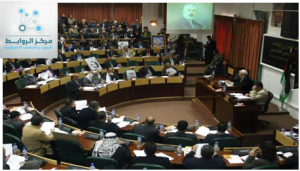By Dr. Salim Zanoun
Translated by : mudhaffar al-kusairi
President Abbas announced his intention to organize general legislative elections to renew the Palestinian legitimacy and prepare for the next stage in which the Palestinian issue faces a historic turning point and fateful challenges. In this paper, which Dr. Salim Zaanoun addresses Palestinian elections and focuses on the philosophy of conflict management.
The call of President Abbas to hold elections and the subsequent measures of Central Elections Committee , as much as it forms an opportunity to renew the legitimacy of the institutions of governance , it forms , if it is held , a new instrument for Israel and the International community in ( the administration) and not (the solution) to the Palestinian –Israeli conflict .
First, the election decision is not Palestinian, and it is held to achieve goals.
Under the Oslo Accords, the Palestinian Authority has held four elections since its inception, two sessions for the election of a President in 1996 and 2005, and two sessions for the election of the Legislative Council in 1996 and 2006 .
The Palestinian elections are unique, with two main characteristics:
The first characteristic is that all elections cycles were not a Palestinian decision, but an external decision, in which Israel and the international community are the main pillar. If they don’t agree and provide support and overcome obstacles, the elections would not be held, and they have the means and tools capable of disrupting them.
The second characteristic is that all sessions were designed to achieve a certain main objective:
-The 1996 elections came with an international resolution and Israel’s approval , with the aim of legitimizing the Oslo agreement and the institutions that emerged from it , and granting the PLO popular cover to lead the transformation of the national project into the Palestinian Authority project.
– The legislative elections of 2006 came as an international decision in the framework of an international project to integrate political Islam into governance in which Hamas was the first example , therefore the USA , the European Union an Israel agreed to its participation despite its presence on the lists of terrorism and not meeting the Quarter committee’s conditions in order to establish a geopolitical divide and dismantle the Palestinian project .
Second: the current elections:
Understanding the decision to call elections at the present time will not be in isolation from understanding the decisions of the elections in previous sessions. Elections, if they occur, are primarily an Israeli and international desire and decision imposed on all Palestinians, as a means to achieve new goals over the next decade.
1. Rebuilding the political system on a new basis, based on rearranging party weights to ensure building a political system based on preventing any political bloc from dominating the system.
2. A struggle for legitimacy , supported by popular will , the 2006 elections created a geopolitical system divided by force of arms , both sides lack legitimacy . This means that it is impossible to heal again and move from (dismantling) to (strengthening the dismantling) pf the Palestinian project.
3. The emergence of new party components , the new ones are :
The Palestinian Democratic Rally (the five factions of the left) and the Democratic Reform Movement (Fatah).
-if the reformist movement participates in an electoral list , it means the official division of Fatah movement and the final exit from it , and it will not work to talk that it is part of it and will not come out of it.
-The Palestinian Democratic Rally and the Reform Movement are competing for the position of the third bloc, noting that matters can not be measured by the location of the third bloc, as much as measured by the size of the gap from the second and third bloc, it is the size of the gap that will determine the effectiveness of the third bloc in the Palestinian structure.
Given that if the elections are conducted, they will be decided by an international resolution, and with Israeli approval, to build a new philosophy to manage the Palestinian –Israeli conflict over the next decade. It produced a more fragile Palestinian system , in which non of the forces would dominate the system , ith the difficulty of achieving hegemonic alliances enjoying weight , and moving into a new phase of internal conflict , a struggle for legitimacy backed by popular will .
If this scenario is achieved, the Palestinians are on the threshold of a new phase of Palestinian entity, which prevents them from being brought together in a single legitimacy and single political system that unites their political and struggle efforts. , on the other hand , it enhances the ability of Israel to continue in (administration) and to (resolve) the conflict and facilitates the processes of influence and external pressure on the Palestinian decision to accept the programs and solutions presented in this issue .
Rawabet Center for Research and Strategic Studies

